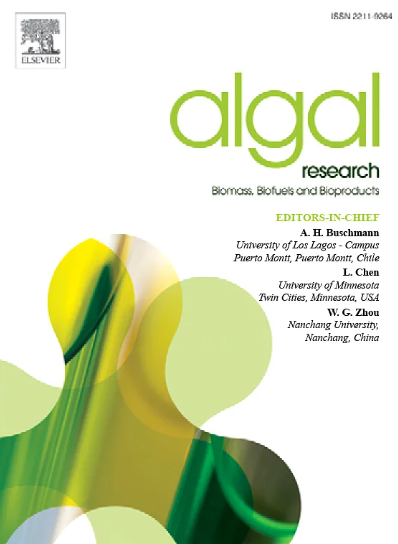紫外线-B 光(辐射)对绿藻 Edaphochlorella mirabilis 和 Klebsormidium flaccidum 体外色素和脂肪酸代谢的影响
IF 4.6
2区 生物学
Q1 BIOTECHNOLOGY & APPLIED MICROBIOLOGY
Algal Research-Biomass Biofuels and Bioproducts
Pub Date : 2024-10-01
DOI:10.1016/j.algal.2024.103736
引用次数: 0
摘要
藻类提供了丰富的生物活性化合物来源,适用于食品和生物能源。环境挑战,如营养匮乏、极端 pH 值和温度、高光照强度和紫外线辐射,通常会促使藻类产生过量的脂质、抗氧化剂和其他生物保护分子,作为其生存适应的一部分。藻类培养可提供蛋白质、脂类、碳水化合物、维生素、抗氧化剂和微量元素。本研究的重点是了解作为非生物压力源的紫外线-B 辐照如何影响两种绿藻的生长和代谢产物的产生,这两种绿藻分别是神奇小球藻(叶绿藻纲)和弛缓小球藻(角叶藻纲)。使用临时浸泡系统生物反应器进行体外藻类生长,结果显示两种藻类在紫外线-B照射后的生物量没有显著差异。不过,丙二醛水平的评估结果显示,与对照组相比,经处理的 E. mirabilis 的脂质过氧化倾向明显更高(+ 90 %)。相反,K. flaccidum 的差异并不明显,这表明其对紫外线-B 辐射的适应能力更强。总体而言,经紫外线-B 处理的两种藻类的色素积累都有所增加。K. flaccidum 的色素平均增加了 53% 以上,而 E. mirabilis 的色素平均增加了 30% 以上,增幅较低。紫外线-B照射下的弛叶草样本中抗氧化化合物(叶黄素、β-胡萝卜素和叶绿素a)显著增加,这也表明弛叶草有更合适的适应策略来减轻氧化压力。在弛叶草中,多不饱和脂肪酸的增加可能与抗氧化化合物产量的增加有关。相反,E. mirabilis 似乎通过减少多不饱和脂肪酸而增加饱和脂肪酸来保护自己。在这两种藻类中,紫外线胁迫下次生代谢物的增加凸显了其作为供人类食用的新型食物来源的潜力,值得进一步研究。本文章由计算机程序翻译,如有差异,请以英文原文为准。
UV-B light (radiation) affects the metabolism of pigments and fatty acids in green algae Edaphochlorella mirabilis and Klebsormidium flaccidum in vitro
Algae offer a rich source of bioactive compounds suitable for food products and bioenergy. Environmental challenges such as nutrient scarcity, extreme pH and temperature, high light intensity, and UV radiation usually trigger algae to produce excess of lipids, antioxidants, and other bioprotective molecules as part of their adaptations for survival. Algal cultivation provides proteins, lipids, carbohydrates, vitamins, antioxidants, and trace elements. This study focused on understanding how UV-B irradiance, as an abiotic stressor, can influence the growth and metabolite production of two green algal species, Edaphochlorella mirabilis (Chlorophyta) and Klebsormidium flaccidum (Charophyta). Using a temporary immersion system bioreactor for in-vitro algal growth, the results showed no significant difference in biomass for both algal species after the exposure to UV-B rays. However, the assessment of malondialdehyde levels revealed a significantly higher tendency towards lipid peroxidation in treated E. mirabilis (+ 90 %) compared to control. Conversely, K. flaccidum did not display significant differences, thereby highlighting a more advanced adaptive capacity against UV-B radiation. Overall, both algal species treated with UV-B showed increased pigment accumulation. K. flaccidum exhibited an average pigment increase of over 53 %, while E. mirabilis showed a lower increase, over 30 % on average. The notable rise in antioxidant compounds (lutein, β-carotene, and chlorophyll a) in UV-B exposed K. flaccidum samples also suggested a more suitable adaptive strategy to mitigate oxidative stress in Charophyta. In K. flaccidum, the increase in polyunsaturated fatty acids can be associated with increased production of antioxidant compounds. Conversely, E. mirabilis appeared to protect itself by decreasing polyunsaturated fatty acids in favor of saturated ones. In both algal species, the increase in secondary metabolites under UV stress highlighted potential as a novel food source for human consumption, deserving further investigation.
求助全文
通过发布文献求助,成功后即可免费获取论文全文。
去求助
来源期刊

Algal Research-Biomass Biofuels and Bioproducts
BIOTECHNOLOGY & APPLIED MICROBIOLOGY-
CiteScore
9.40
自引率
7.80%
发文量
332
期刊介绍:
Algal Research is an international phycology journal covering all areas of emerging technologies in algae biology, biomass production, cultivation, harvesting, extraction, bioproducts, biorefinery, engineering, and econometrics. Algae is defined to include cyanobacteria, microalgae, and protists and symbionts of interest in biotechnology. The journal publishes original research and reviews for the following scope: algal biology, including but not exclusive to: phylogeny, biodiversity, molecular traits, metabolic regulation, and genetic engineering, algal cultivation, e.g. phototrophic systems, heterotrophic systems, and mixotrophic systems, algal harvesting and extraction systems, biotechnology to convert algal biomass and components into biofuels and bioproducts, e.g., nutraceuticals, pharmaceuticals, animal feed, plastics, etc. algal products and their economic assessment
 求助内容:
求助内容: 应助结果提醒方式:
应助结果提醒方式:


